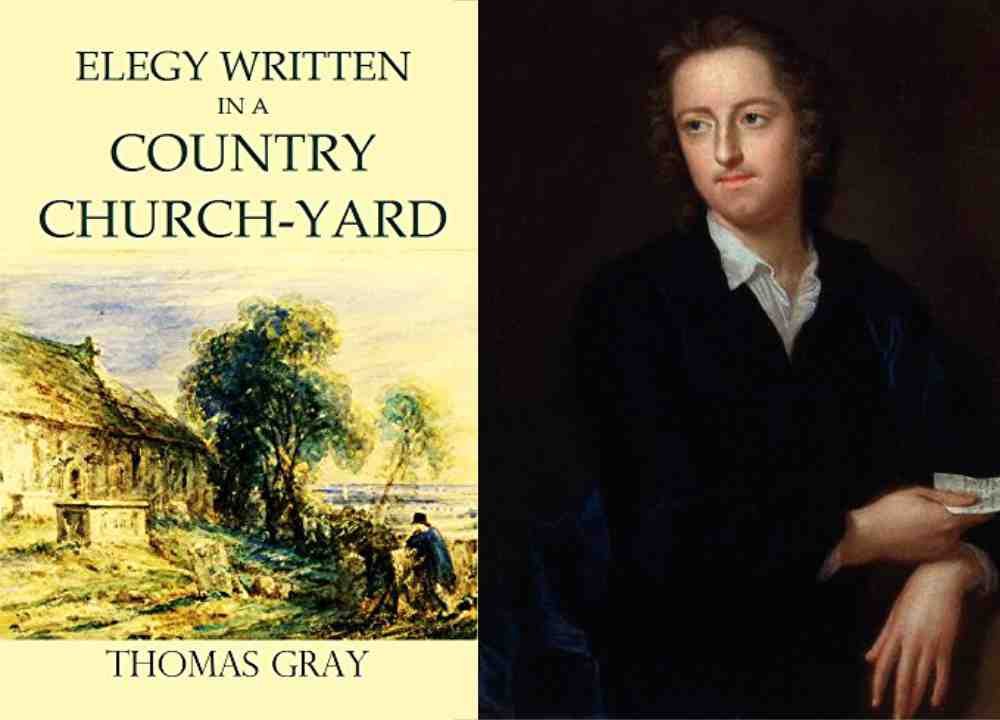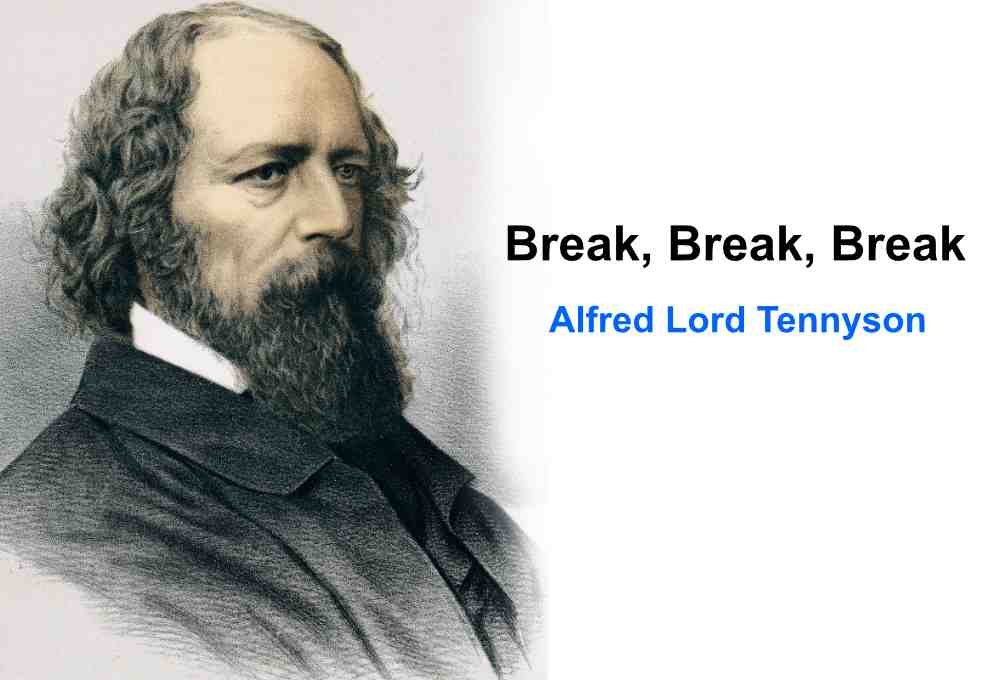The famous 18th-century poet Thomas Gray was born December 26, 1716, Cornhill, London. Gray’s childhood was full of troubles because his father, Philip Gray, who was a wealthy scrivener in London, often treated his mother harshly and violently.
It was the year of 1725 when Thomas Gray was sent to Eton. At Eton, he was very happy. Horace Walpole ( novelist of the famous gothic novel ‘Castle of Otranto’) and son of a distinguished lawyer Richard West were his close friends. Eton influenced him very much throughout his life. He started poetry writing with Latin verse of considerable merit at Eton.
Gray was a man of versatile genius. In 1757, Thomas Gray was offered the position of poet Laureate, but he did not accept it. He was not only an English poet but a classical scholar, letter – writer and professor at Pembroke College (Cambridge) as well.

Thomas Gray, an extremely self – Critical poet, despite being very popular, in his lifetime he published 13 poems only. “The Progress of Poesy” and “The Bard” (both Pindaric odes), “Ode on the death of a Favourite Cat, Drowned in a Tub of Goldfishes”, “Ode on the Spring”, ” Ode to a Distant Prospect at Eton College”, “The Fatal Sisters: An Ode”, “On the Death of Richard West” and “Elegy Written in a Country Churchyard” are some of his poems. But no poem got as much importance and popularity as his “Elegy”. In this article, it will be discussed in full detail.
Background of “Elegy Written in a Country Churchyard”
Table of Contents
Actually, no one has any knowledge about the origins of Thomas Gray’s ‘Elegy’. In 1742, his friend and poet Richard West died. Thomas Gray’s thoughts over the death of his friend partly inspired the poem. Thomas Gray started composing the “Elegy Written in a Country Churchyard” in 1742 and completed it in 1750 at St Poges. In the year 1751, It was first published.
“Elegy Written in a Country Churchyard” Summary
It is the time of evening. The poet/ speaker is in a Country Churchyard. A bell tolls and it indicates that the day is about to end. The sun is setting, the church tower is covered in ivy and hooting of an owl also can be heard.
In this type of setting the poet draws the attention of readers to the graves of the churchyard. In those graves, simple and rustic people of the village are buried. Since all buried people are dead, therefore:
The breezy call of incense – breathing Morn,
The swallow twittering from the straw – built shade,
The cock’s shrill clarion, or the echoing horn
will not wake them. Moreover, they could not enjoy the pleasure of life and most importantly that of family life. All these dead villagers were farmers. When they were alive, they used to work hard in their fields and perhaps felt joy in doing so. The poet forbids people to mock the good, simple, honest and hardworking life of these people because, after death, high – borning and wealth will be of no use.
The poet then talks about those who are buried in unmarked graves. The speaker wonders who they were? if they were full of passion too, or potential leader or beautiful player of the layer. The speaker expresses his sorrow for the villagers who couldn’t learn much about the world. The poet talks about the villagers in relation to the education, knowledge and poverty:
"But knowledge to their eyes her ample page Rich with the spoils time did ne'er unrolled; Chill penury repressed their noble rage, And froze the genial current of the soul."
The poet, has used a series of analogy,says that the skills and talents of the villagers are the same as the gems that are impossible to find or like that flower which blooms but remains unseen. The poet again says that there is it’s probability that in the grave, there might be some great poets, politicians and kings.
Since, the villagers were not rich, they were innocent, kind and merciful and honest with the world. These people will not be remembered and it’s only reason is their poverty. They lived in the country; a calm and peaceful place , “Far from the madding crowd” of cities.
To restrict people from accidentally desecrating their places of burial, the graves are protected by simple grave markers. Their tombstones are modest, they (tombstones) reflect only names, date of birth and date of death. Since these people were unknown to the world, so none has written elegies in praise of them. These graves, for the speaker, are that of great importance that’s why he stops there and talks about their simple life.
Then, the speaker thinks about himself in relation to these dead people. Though the villagers were poor and not known in the world, yet he visited their graves and composed a grand elegy in their praise. He wonders, after his death, who will perform such activities for him, as the poet is performing now. It may be a person similar to him (speaker) – “some kindred spirit”, or a farmer who would remember the poet’s various activities and how sorrowful he was seen in the churchyard.
The speaker wonders whether the farmer would mind that ( speaker) is no more or died and he has not seen him at that place, since a long time. Finally, he talks about funeral dirges and the epitaph of his own.
The speaker in the epitaph says that he has died (similar death that of the villagers):
” A young to fortune and to fame unknown”. But, unlikely, in comparison to the poor and uneducated villagers, he was not only a scholar but a good poet also. The speaker urges us that we remember him for his generosity and sincerely. It was due to his sincerity and generosity that nature has gifted him a friend (who would mourn for him after his death).
In the concluding lines, the speaker forbids people to praise him (further). He equally forbids to mention his flaws or shortcomings. In this way the poem is an elegy for both – the (dead) villagers and the speaker. After reading this poem, it is clear that the speaker wanted to be remembered with both – ‘great and famous’ and ‘uneducated, unknown, poor commoners’ of the village.
Analysis of “Elegy Written in a Country Churchyard”
Inevitability and universality of death, social class and opportunity and intimacy and love of family members to each other are some notable themes of Gray’s poem.
Inevitability and universality of Death
Death is that horrible truth which every person has to face. Any person who comes to this universe has to die one day. The very title of “Elegy Written in a Country Churchyard”, has introduced the theme of death. As we know, an elegy is a poem or the song of mourning on the loss or death of any great or dear person. But Gray, in this poem, remembers poor people of a village who have died. He says about them:
“Each in his narrow cell for ever laid
The rude Forefathers of Hamlet sleep”
The theme of death is further introduced in the case of those people who laugh at the manners, poverty and education of the villagers. The poet says that (wealthy) people should not laugh at these poor people because:
"The boast of heraldry, the pomp of power, And all that beauty, and all that wealth e'er gave, Awaits alike the inevitable hour. The paths of glory lead but to the grave"
Finally, the theme of death comes in the case of speaker/poet as well. The speaker says that at present, he is visiting the graves of poor people. One day, he also would die. Then, what kind of person would visit his grave and remember him.
In this way, Gray has introduced the theme of death in the sense of past, present and future. Those who came earlier to us in this world have died. Those who are alive will die one day and those who will come in future will also taste the bitter draught of death.
Social class and opportunity
All those villagers who are now dead were poor farmers. Due to their poverty, they could not get an education and practical knowledge which is quite important to develop innate abilities in any person. If they had got practical knowledge, they surely would have been born as great artists, eminent leaders of the nation and saints amongst them. But, by giving examples of 17th-century
English Civil wars Gray proves that those people who perform tasks of great importance, there is its a probability, they can do great wrongs with the people as well. Therefore, these farmers who were born in a social class (community) that was suffering from poverty, on the one hand, due to it (poverty) lost the chance of becoming men of letters. On the other hand, it was due to the same social class of poverty; they were restricted to commit great crimes.
An attentive study of the “Elegy Written in a Country Churchyard” consoles the poor that poverty is not only a curse. It is a boon in a way, that the peasants of the village, in spite of belonging to a social class of poverty were decorated with outstanding and praiseworthy qualities of characters ie innocence, mercy, kindness and honesty.
Intimacy and love of family members to each other
The villagers, when they were alive, fully enjoyed their lives. The farmers used to work hard in their fields the whole day. In the evening, when they were returning to their homes, the family members shower their love on them (see lines 21 – 25, For them no more the blazing hearth…….. the envied kiss to share).
But after their deaths, their near and dear remember them. It will make their eyes wet since they are no more amongst them. In this way, Gray has introduced the theme of family love but told the importance of love in human life also. Though they were not prosperous and their lives were full of difficulties, but intimacy and affection in the family members had made their lives simple and enjoyable.
Conclusion
In this article, first of all (in short) the life and works of Thomas Gray have been discussed, his ‘Elegy Written in a Country Churchyard ‘ has been Summarized. At last, some important themes of this poem have been analysed.
“Elegy Written in a Country Churchyard” F.A.Q
Who were Thomas Gray’s uncles?
Robert Antrobus and William Antrobus were his uncles.
Who became Thomas Gray’s tutor
His uncle William Antrobus became his tutor at Eton College
When did Thomas Gray die
Gray died on July 30, 1771 at Cambridge (England).
To what school of poetry does Gray belong?
Gray belongs from graveyard school of poetry.
What are the opening lines of u0022Elegy Written in a Country Churchyardu0022 ?
u0022The curfew tolls the knell of parting day, The lowing herd wind slowly o’er the leau0022 is opening lines of ‘Elegy Written in a Country Churchyardu0022.
Which famous 17th century English poet is mentioned in the u0022Elegy Written in a Country Churchyardu0022 ?
John Milton.u003cbru003e
Is Gray’s u0022Elegyu0022 an autobiographical poem?
Though not fully, but to some extent, the u0022Elegy Written in Country Churchyardu0022 autobiographical because, though in the centre of the poem are (dead) common villagers in the u0022Elegyu0022 the poet has thrown light on some aspects of his life also.





